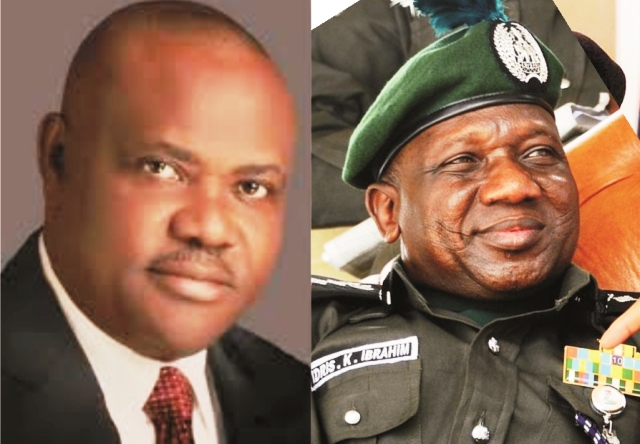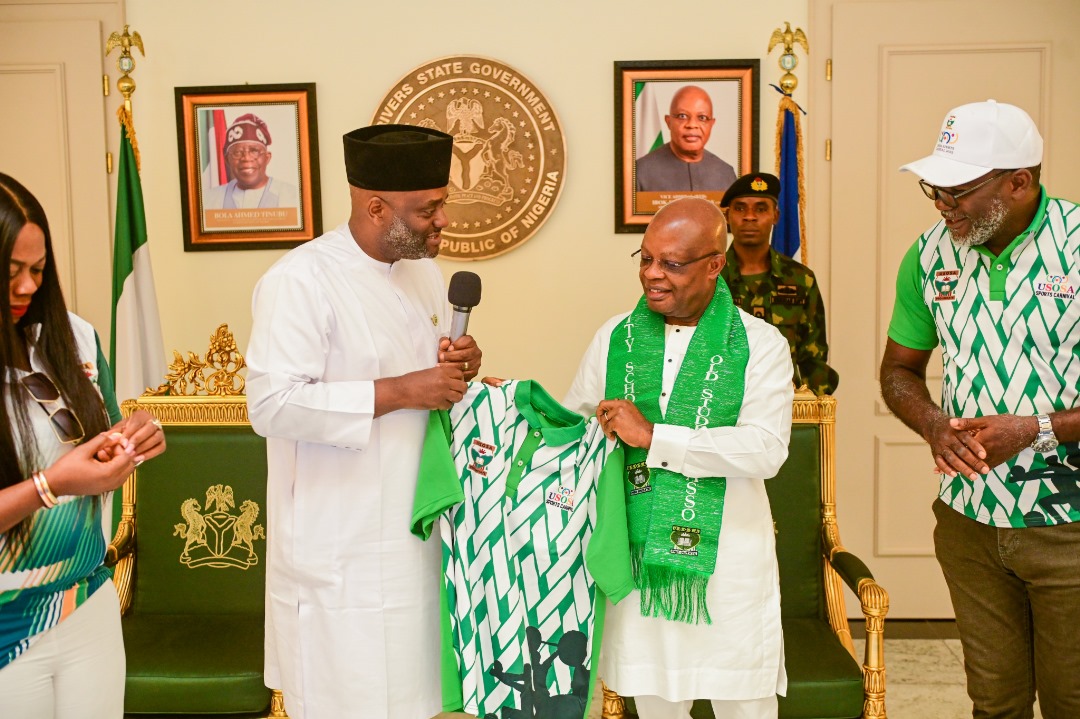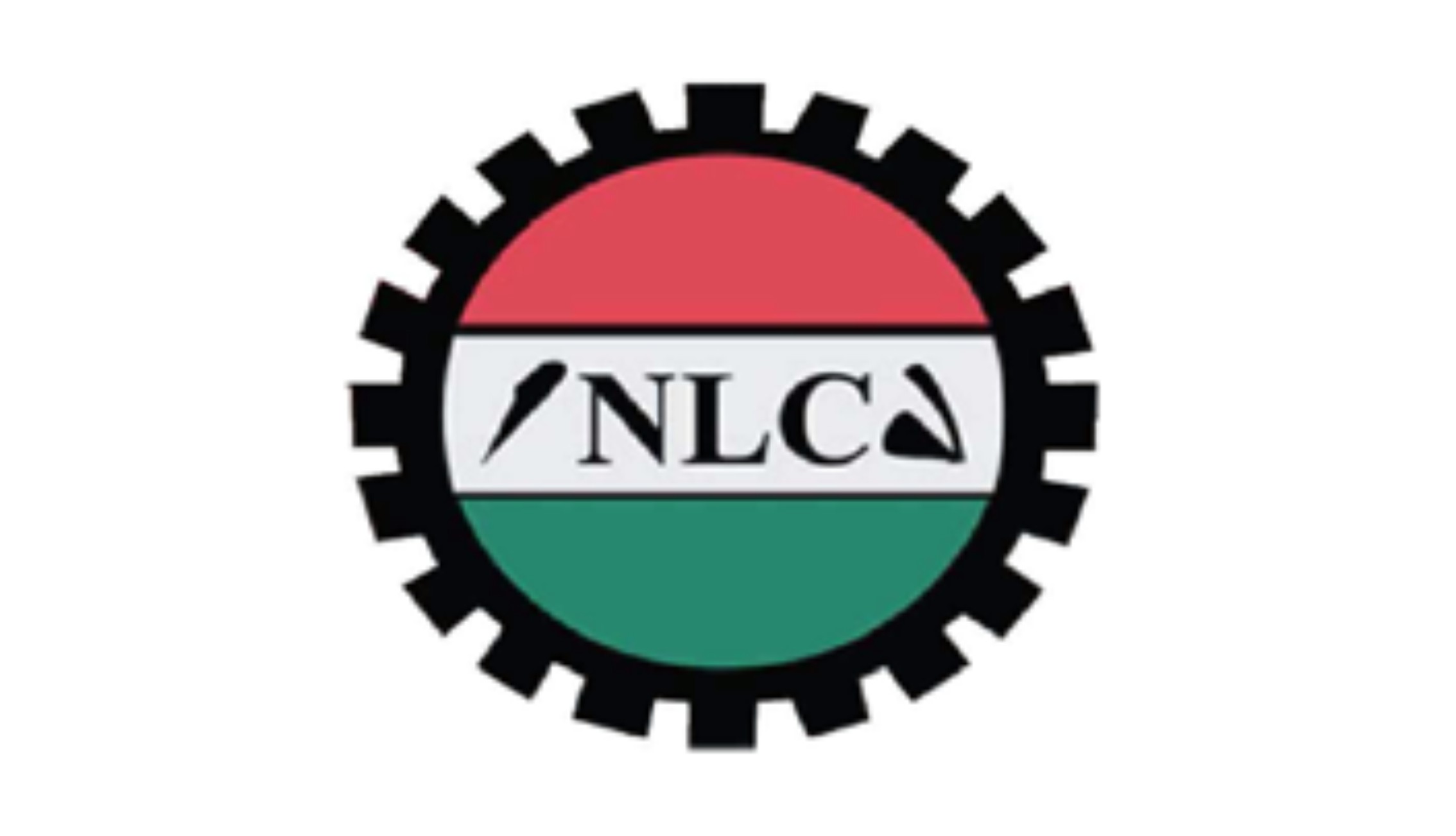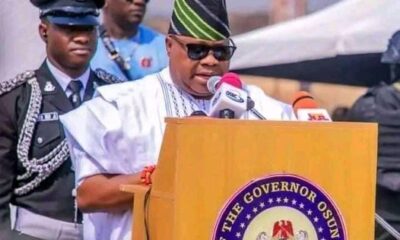Featured
That Alarm By Gov Wike …Why Police, INEC Must Act

No sane Nigerian can dispute the fact that the country is facing tough times. Times, so challenging, nothing short of financial discipline, political tolerance, prudent management of scarce resources and indeed selfless service are required of those the people look upon to offer leadership.
It is a period that demands optimum protection and maintenance of existing infrastructure, build capacity and inspire the people to give of their best in hope that the period will merely be a phase that would soon be history.
These indeed are times when governments and the people alike must unite in fight against unnecessary controversies likely to cause insecurity, strife and indeed further destruction of an already creeping economy.
Last week, Nigeria’s Finance Minister Kemi Adeosun said the dark days are over. But no Nigerian that patronises the market place would share same sentiment, for, it amounts to telling a blind man that there is salt in his soup, when there is none.
Truth is, many states cannot pay workers’ salaries. More than a bunch is in arrears of close to eight months, while others who manage to meet their obligations to their workforce do so at great pains and at the expense of other competing needs, like the much required infrastructural update necessary to attract investments and boost internal revenue generation.
These indeed are times when, even the Federal Government borrows to pay its staff, with doubts hanging around the full implementation of the 2016 budget. With the free fall of the Naira against other major currencies, a virtually dead manufacturing sector and with inflation rate hitting an all time 17 per cent high, it should dawn on all that all is not well.
At times like this, to allow any form of insecurity, protestations and violent conflicts would be putting salt upon injury. It indeed would be a perilous voyage to encourage any miscarriage of justice or promotion of partisanship that would push those denied justice seek alternative reliefs.
This is because such can threaten security and ultimately breed insecurity. Where such insecurity holds way, where crime blossoms where injustice reins, where lawlessness replaces rule of law and where impunity takes the place of order, all other positive efforts take back seat. Investors are threatened, and the local economy at the risk of getting stalled.
These are why none should venture any action or inaction capable of engineering chaos, crisis, insecurity and strife. These indeed are why the concerns recently expressed by Rivers State Governor Nyesom Wike concerning, ‘flawed’ police postings and ‘glaring efforts’ by the Independent National Electoral Commission (INEC) to rig the forthcoming re-run elections in Rivers State, must be addressed and fast too, to prevent the agitated from seeking alternative reliefs.
Last week, the governor pointedly accused the National Chairman of INEC, Professor Mahmud Yakubu of moves to scuttle credible re-run elections in the state by holding secret meetings with the state’s All Progressives Congress, with APC Chairman, Chief Davies Ikanya, Senator Magnus Abe and others on July 19, this year. According to the Governor, the INEC boss might have concluded plans to postpone the July 30 elections over fears of defeat expressed by the APC leadership, or rig the elections in favour of the APC.
Wondering why anyone would be happy to destroy Rivers State just because he or she wants to satisfy the politician who funded APC national elections through Rivers resources, the governor lamented:
“They are frustrating elections in Rivers State because of one man who sponsored APC. They have posted electoral officers from APC states to rig elections and they want to accede to the request of the Rivers APC to post out the Resident Electoral Commissioner.
“But the truth is that nobody can rig elections in Rivers State. The INEC Chairman only has the power to postpone elections but he has no power to rig elections here.
“As I speak to you, 7.30 to 8pm, on 19th of July, 2016, the APC Chairman, Davies Ikanya, Senator Magnus Abe and others, were with the National Chairman in his office.
“Rivers State is key to development of this country. Will they continue to deny us representation at the Senate and majority of the constituencies of the House of Representatives?”
These are serious concerns. Even more worrisome is the alarm raised by the governor over recent postings in the Police Command, which he described as politicized.
According to Governor Wike, the new Inspector General of Police (IGP) recently posted Mr. Akin Fakorede, a Police officer formerly in-charge of the state’s Special Anti-Robbery Squad and who allegedly distributed fake SARS uniforms to APC thugs during the March 19, re-run elections leading to the death of several innocent Rivers people. He also accused the same officer of embezzling N18 million meant for the rehabilitation of armoured personnel carrier before he fled the state, after the last re-run.
Governor Wike also accused the IGP of posting back to the state, one Mustapha who ran away from the state after giving false testimony at the Governorship Elections Petitions Tribunal. According to the governor, that ‘APC Witness’ has now been posted to head MOPOL 56 in Bori, one of the battle-ground locations, in the July 30, rerun elections.
He added that the Police High Command also reposted to the state, one Stephen Asin, an officer formerly in charge of the Special Anti-Robbery Squad, after same officer had allegedly declared publicly that he would destroy the security network in the state. That Asin, the governor alerted, is now to head the Police Operations Department in the state.
The governor said, ‘my interest is for the security of the state to be sustained. We are enjoying relative security in the state and I will not fold my arms and allow anyone destroy the security of the state through the posting of politicians who hide under Police uniforms’, he said.
These are serious accustations that ought to attract the urgent response of both the Police High Command and INEC. This is because one wants to resist the temptation of rushing to the natural conclusion that silence means acceptance. In this case, acceptance of the governor’s concerns as true in every material particular. Even so, I pray am wrong.
This is because, one of the greatest incentives to strife and conflict, is the attempt to impose one’s ambition on others, even when as one time United States President Abraham Lincoln once warned, ‘no one is good enough to lead another man without that other’s consent.’ The crises that characterised the elections in Bayelsa State last year, where, several lost their lives, is traceable to same conflict of interest.
Delta State is now boiling on account of renewed insurgency by a new group of militants, Bayelsa sleeps with only one eye closed, Cross River is facing challenges of criminal gangs. To push Rivers State into any form of disturbance would not be in the interest of the country, and its economy.
While one is reluctant to agree with the governor that APC leaders’ meeting with the INEC Chairman is wrong. What is wrong is the INEC chair’s refusal to grant same audience to the PDP leadership or even return the governor’s call, just as didn’t the new IGP.
Also curious is the timing of the postings and the calibre and character of those involved. The choice of officers, obviously APC-friendly, if records of the last Governorship Petitions Tribunal are any leads to go by; indeed raises eyebrows and portend a special assignment. Such job cannot be apolitical, unless INEC and the Police convince the people otherwise.
INEC in particular, must realise that once the populace loses confidence in its impartiality, it shall brew discontent which in turn gives birth to resistance. Such resistance very often rises up to become civil, even militant disobedience. As supposed umpire, INEC must resist the temptation to support one party against another or one candidate against the other.
Such would, without doubt, heat-up the polity; incite the civil populace against the institution and by extension government, a volatile scenario none should wish for. And not of all places, Rivers.
Rivers is a very strong factor in the economic equation of the country. Its peace should not be sacrificed on the altar of political compensation. The people should instead be allowed to vote according to their conscience and let the people alone determine who represents them.
In spite of what Abuja politicians may wish to accept, Rivers State has enjoyed relative peace and progress. That is why it has become a destination of choice for frontline professional bodies to hold their conferences in the state. The Nigeria Bar Association (NBA) and the Nigeria Guild of Editors (NGE) are merely two of such bodies that consider Rivers as peaceful.
This should not be sacrificed for the likely desire of a group to win the elections by hook or crook, through armed Policemen and soldiers and through fake election results. These can only elicit protests, even violence which scope and consequence cannot be predicted.
My Agony is that some politicians in Abuja still believe that election results written in hotel rooms can be declared, unpopular candidates can be made popular overnight and that elections can be rigged in Rivers State.
In my over 33 years in the business of minding others business, I have come to the conclusion that politicians can only rig successfully, where, they enjoy, at least a marginal majority of the electorate. To attempt to rig when the opposite is true, is to replay the Bayelsa governorship elections debacle. Not at these tough times, please.
Soye Wilson Jamabo
Featured
RSG Commits To Workers’ Welfare …. Calls For Sustained Govt, Labour Partnership

The Administrator of Rivers State, Retired Vice Admiral Ibok-Ete Ekwe Ibas, has assured the commitment of Rivers State government to workers’s welfare and industrial harmony in Rivers State.
The Sole Administrator gave the assurance after meeting with leadership of organized labour unions at the Government House, Port Harcourt on Wednesday.
Ibas reaffirmed government’s policy of prompt payment of salaries and pensions to workers and retirees, stating that all local government employees are not receiving the approved minimum wage.
He disclosed that approval has been given for payment of newly employed staff at Rivers State University Teaching Hospital and the Judiciary, while medical workers in Local Government Areas will now receive correct wages.
Ibas explained that, Government is reviewing implementation challenges of the Contributory Pension Scheme ahead of the July 2025 deadline, adding that Intervention buses have been reintroduced to ease workers’ transportation ,with plans to expand the fleet.
He said specialized leadership training for top civil servants will commence within two weeks, while due consideration is being given to implementing the N32,000 consequential adjustment for pensioners and clearing outstanding gratuities.
Ibas commended Rivers State workers for their dedication to service and called for sustained partnership with labour unions to maintain industrial peace.
“This administration recognizes workers as critical partners in development. We remain committed to addressing your legitimate concerns within available resources,” he stated.
The State NLC Chairman, Comrade Alex Agwanwor, thanked the Administrator for the steps taken so far with regard to workers welfare while appreciating his disposition towards alleviating the transportation problem faced by workers.
He also expressed appreciation for the government’s openness to dialogue and pledged continued cooperation towards achieving mutual goals.
The Rivers State Government assured all workers of its unwavering commitment to their welfare and called for continued dedication to service delivery for the collective progress of our dear State.
Featured
Labour Unions In Rivers Call For Improved Standard Living For Workers

The Nigeria Labour Congress (NLC), Rivers Council, has called for policies that will improve the economic situation of the country in order to ensure enhanced living standard for workers.
The State Chairman, Mr Alex Agwanwor, made the remark on behalf of the unions affiliated to Labour Congress during the 2025 workers day celebration in Port Harcourt, yesterday.
Agwanwor highlighted the demands of the Unions which included the immediate payment of pension arrears, implementation of the N32,000 minimum wage for pensioners, and payment of gratuities and death benefits without further delay.
“We are calling for the regulation and protection of e-hailing drivers, implementation of increments and promotions, and resolution of long-standing issues in the polytechnic sector,” he said.
Agwanwor on behalf of the unions appealed to President Bola Tinubu to reinstate the democratically elected Governor, Deputy Governor, and members of the Rivers State House of Assembly.
He stressed the importance of democratic governance and good working relationship with elected representatives.
According to him, the unions expressed disappointment over the imposition of taxes, increase in electricity tariff, and high cost of goods and services, which have further worsened the plight of workers.
“We urge the federal government to take measures to alleviate the suffering of citizens,” he said.
Featured
Tinubu committed to unlocking Nigeria’s potential – Shettima

Vice-President Kashim Shettima says President Bola Tinubu is committed to unlocking Nigeria’s full potential and position the country as a leading force on the African continent.
Shettima stated this when he hosted a delegation from the Hertie School of Governance, Berlin, led by its Senior Fellow, Dr Rolf Alter, at the Presidential Villa in Abuja last Wednesday.
He said Nigeria was actively seeking expertise from the global best institutions to enhance policy formulation and implementation, particularly in human capital development.
The Vice-President noted that President Tinubu was determined to elevate Nigeria to its rightful position as a leading force in Africa.
“The current crop of leadership in Nigeria under President Bola Ahmed Tinubu is ready and willing to unleash the full potential of the Nigerian nation on the African continent.
” We are laying the groundwork through strategic reforms, and at the heart of it, is human capital development.”
He described the Hertie School as a valuable partner in the journey.
According to him, Hertie School of Governance, Berlin, has track record and institutional knowledge to add value to our policy formulation and delivery, especially in this disruptive age.
Shettima reiterated the government’s priority on upskilling Nigerians, saying ” skills are very important, and with our Human Capital Development (HCD) 2.0 programme.
“We are in a position to unleash the full potential of the Nigerian people by enhancing their capital skills.”
The Vice-President acknowledged the vital support of international development partners in that effort.
” I want to thank the World Bank, the European Union, the Bill and Melinda Gates Foundation, and all our partners in that drive to add value to the Nigerian nation,” he maintained.
The Vice-President said human capital development was both an economic imperative and a social necessity.
Shettima assured the delegation of the government’s readiness to deepen cooperation.
” We need the skills and the capacity from your school. The world is now knowledge-driven.
“I wish to implore you to have a very warm and robust partnership with the government and people of Nigeria.”
Shettima further explained recent economic decisions of the government, including fuel subsidy removal and foreign exchange reforms.
“The removal of fuel subsidy, the unification of the exchange rate regime and the revolution in the energy sector are all painful processes, but at the end of the day, the Nigerian people will laugh last.
“President Tinubu is a very modern leader who is willing to take far-reaching, courageous decisions to reposition the Nigerian economy,” he added.
Earlier, Alter, congratulated the Tinubu administration for the successful launch and implementation of the Human Capital Development (HCD) strategy.
The group leader described the development as ambitious and targeted towards the improvement of the lives of the citizens.
He expressed satisfaction with the outcome of his engagements since arriving in the country.
He applauded the zeal, commitment, energy and goodwill observed among stakeholders in the implementation of Nigeria’s HCD programme.
Alter said the Hertie School of Governance would work closely with authorities in Nigeria across different levels to deliver programmes specifically designed to address the unique needs of the country.
He, however, stressed the need for government officials at different levels to be agile and amenable to the dynamics of the evolving world, particularly as Nigeria attempted to successfully accelerate its human capital development aspirations.
-
Sports3 days ago
Arsenal Eye Special Performance In Paris
-

 News3 days ago
News3 days agoFG Licenses 11 New Private Universities
-
Business3 days ago
Over 2m Passengers Board Blue Rail Train – Commissioner
-

 News3 days ago
News3 days agoAdeleke Approves N4bn Bond To Clear Pension Arrears
-

 Opinion3 days ago
Opinion3 days agoNigeria’s Poor Economy And High Unemployment Rates
-
Sports3 days ago
London Marathon Breaks World Record
-

 Featured3 days ago
Featured3 days agoTinubu committed to unlocking Nigeria’s potential – Shettima
-
Business3 days ago
NECA Holds MSME Fair To Drive Growth

